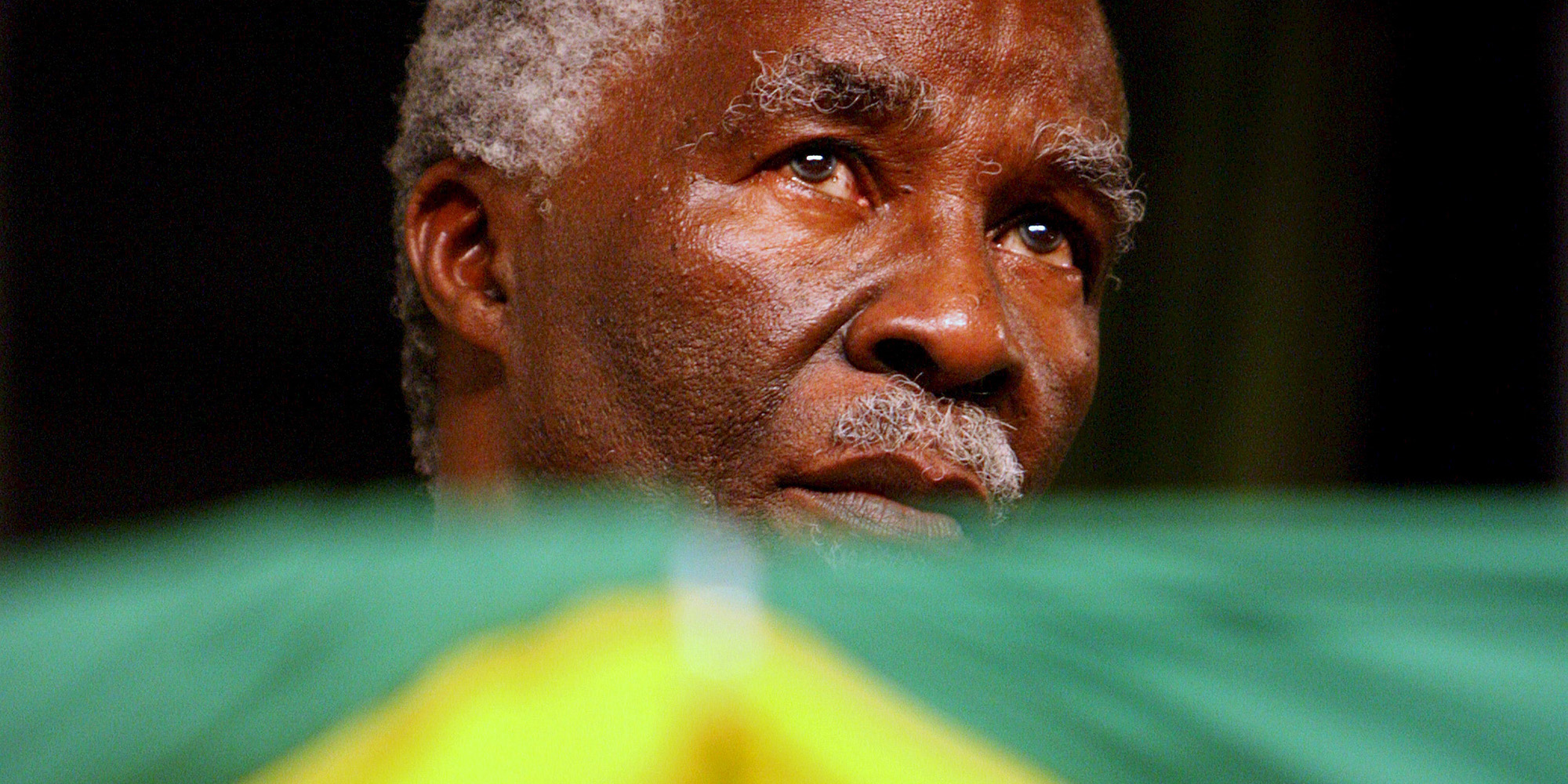While former president Thabo Mbeki was relatively quiet in the years after Jacob Zuma’s victory at the ANC’s Polokwane Conference in 2007, he has become more politically active in recent years.
Last week, while speaking at a memorial service for Aziz Pahad, Mbeki sharply criticised the current leadership of the ANC.
Referring to the ANC’s decision to “renew” itself taken at the 2017 Nasrec conference, he said, “We did not do that, we did not renew the ANC after that conference resolution of 2017. That resolution has been repeated by the conference of 2022, to renew the ANC… We are now in October — that was 10 months ago — nothing has happened to renew the ANC. So what was diagnosed in 2017, we are not attending to.”
He also repeated his critique that the state has become enfeebled under the ANC and is now open to almost wholesale privatisation.
“What this [weakened state] will lead to in the end is that you will have capital and civil society running the country, and the democratic state will have disappeared. For the democratic state to disappear means that the overwhelming majority of our people, the poor, lose hope because capital and the civil society will not help them.”
Mbeki was speaking just before this weekend’s meeting of the ANC National Executive Committee (NEC). As he officially has observer status for NEC meetings, he would have been keenly aware of the timing and he may have wanted to prompt a discussion about these issues within the party.
There is much evidence to show that Mbeki is correct on both points, that:
- Privatisation is a double-edged sword, which can leave the rich with better services and the poor with almost nothing; and
- The ANC appears to be unable to “renew” itself, despite repeated promises that it would.
Ramaphosa won the ANC’s 2017 conference on a promise of “renewal” that was largely a reference to what he later called the “nine wasted years” of State Capture. This obscured the fact that the culture of corruption in the ANC dates back to long before Zuma took over, to the early years of our democracy.
Perhaps the most famous of these early warnings came from then ANC secretary-general Kgalema Motlanthe. In August 2007, he told the Financial Mail’s Carol Paton, “This rot is across the board. It’s not confined to any level or any area of the country. Almost every project is conceived because it offers opportunities for certain people to make money.”
‘Hunger for personal gain’
Mbeki himself, during his address to the Polokwane Conference in December of that year, warned that people “engage in criminal and amoral activities driven by the hunger for personal gain, acquired at the expense of the poor of our country, who constitute the millions-strong constituency which regularly votes for the ANC, and which we proudly claim to represent”.
He went even further.
He quoted Nelson Mandela, from his opening address to the ANC’s 1997 conference, when he said, “One of these negative features is the emergence of careerism within our ranks. Many among our members see their membership of the ANC as a means to advance their personal ambitions to attain positions of power and access to resources for their own individual gratification. Accordingly, they work to manipulate the movement to create the conditions for their success.”
But, as history records, very few listened to Mbeki and Mandela, and the majority of delegates at Polokwane voted for Zuma to take over the leadership of the party.
The corruption that followed has been well documented by the Zondo Commission and the ANC is now trying to fight against a dynamic which looks like an entrenched culture of corruption, coupled with incompetence.
This, in part, is why the ANC has not been able to “renew” itself. There is, after all, plenty of evidence that its structures have been unable to act against corruption.
https://www.dailymaverick.co.za/article/2022-08-03-to-stand-a-chance-in-fight-against-corruption-anc-must-empower-its-integrity-commission-or-else/
More than that, Mandela’s warning about how people “work to manipulate the movement to create the conditions for their success” is surely how people of the dubious calibre of Mduduzi Manana and Malusi Gigaba were re-elected to the NEC.
It will be difficult for the ANC to define what “renewal” really means. If these problems emerged just three years after the ANC was elected into power, then when did it ever govern without them?
The consequence of this is contained in Mbeki’s other point, that the state has become incredibly weak, leading to a situation where the private sector has virtually a monopoly on skills and delivery.
It is normal for a governing party to try to keep as much power as it can for itself and not to relinquish any power willingly. And yet, the move towards privatisation is probably a direct consequence of how corruption has weakened the state.
If Transnet, Eskom and so many other institutions had not been so badly weakened as they were during this time, it is unlikely that the deals involving SOEs and the private sector would be happening to the extent that they are.
The factor that Mbeki has consistently complained about — corruption — has led directly to his other complaint, that the state is being hollowed out.
But, just as Mandela was ignored by ANC delegates in 1997, and as Mbeki was ignored in 2007, so the ANC is likely to (politely) ignore similar warnings now, no matter how many times — every time with increased urgency — Mbeki repeats the warnings. DM





